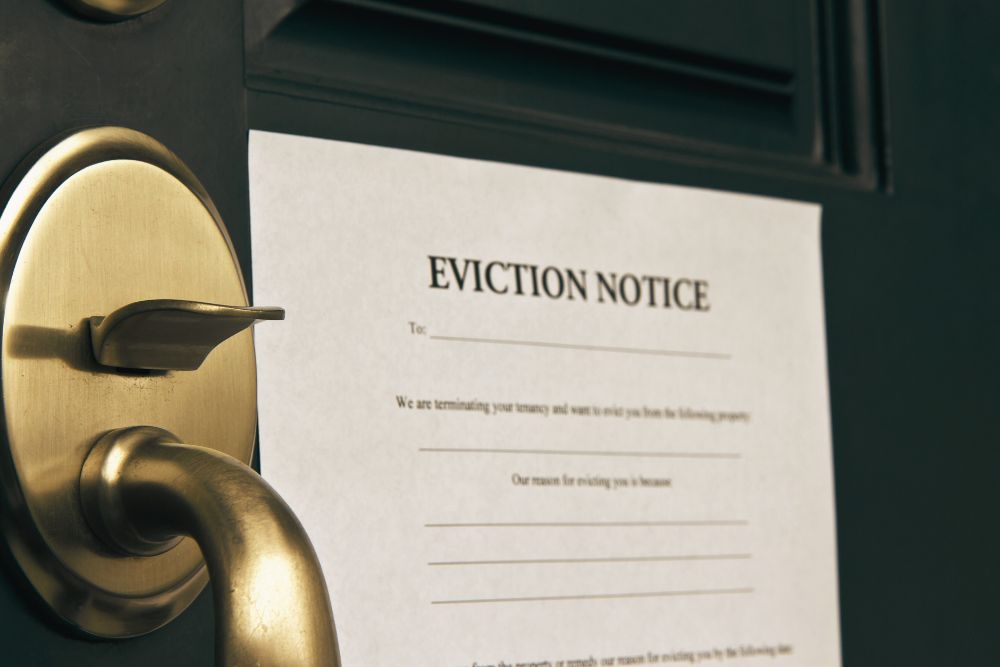If you’re renting in New Jersey, it’s important to know your rights when it comes to notice and eviction time. Landlords can’t just tell tenants to leave—they have to follow legal procedures. The amount of time a landlord must give a tenant to move out depends on the reason for the eviction and the type of lease you have. In this post, we’ll break down the notice and eviction timeline in NJ in different situations, and provide an easy-to-understand table so you can see your rights at a glance.
Types of Eviction Notices in New Jersey
Non-Payment of Rent
If a tenant falls behind on rent, the landlord can start the eviction process right away. There’s no required notice period in this case—if rent is overdue, the landlord can file an eviction complaint in court without giving any advance notice. See New Jersey Stat. Ann. § 2A:18-61.2 for more information.
Violation of Lease Agreement (Other Than Non-Payment)
If a tenant violates the lease in some other way (like having unauthorized pets, damaging the property, or disturbing other tenants), the landlord has to give a written notice.
For serious breaches, such as illegal activity, a 3-day notice may be enough.
For less serious violations, the landlord usually needs to give a 30-day notice, giving the tenant time to fix the problem or move out.
Month-to-Month Tenancy
Tenants on a month-to-month lease must be given 30 days’ notice before the landlord can ask them to move out. This notice can be given for any reason, as long as it’s legal and non-discriminatory.
Landlord Wants to Use the Property Personally
If the landlord wants to take back the rental unit to live in it themselves or for a family member, they have to give the tenant 60 days’ notice.
Property Is Being Taken Off the Rental Market
When a landlord decides to permanently stop renting out the property (for example, turning it into a private residence), they must provide a 60-day notice to the tenant.
Converting Property to Condos or Co-ops
If the rental property is being converted into condominiums or a cooperative, tenants are entitled to a long notice period of 3 years.
Illegal Activity
If the tenant is involved in illegal activities, like drug dealing or other crimes on the property, the landlord can file for eviction with just a 3-day notice.
The Eviction Process in New Jersey
In New Jersey, eviction is a legal process. After providing the proper notice, the landlord must file an eviction complaint in court. The tenant then has the chance to appear in court and present their case. If the judge sides with the landlord, a judgment of possession will be issued, meaning the tenant has to move out. Only a court officer can enforce the eviction, so landlords are not allowed to lock out tenants or shut off utilities on their own (this is known as “self-help” eviction and is illegal).
Notice and eviction timeline in NJ explained
| Reason for Eviction | Notice Period | Details |
|---|---|---|
| Non-payment of rent | No notice required | Landlord can file for eviction immediately after rent is overdue. |
| Lease violation (non-rent-related) | 30 days or 3 days | 3 days for serious violations like illegal activity; 30 days for other lease breaches. |
| Month-to-month tenancy termination | 30 days |
Landlord can terminate the lease for any legal reason with 30 days’ notice.
|
| Landlord needs property for personal use | 60 days | Applies if the landlord or an immediate family member will move into the property. |
| Permanent retirement of property from rental market | 60 days | Applies when the landlord is permanently taking the property off the rental market. |
| Conversion to condominium or cooperative | 3 years | Tenant is entitled to 3 years’ notice when the landlord is converting the property into a condo or cooperative. |
| Illegal activity | 3 days | Landlord can evict with 3 days’ notice if the tenant is engaged in illegal activities on the property. |
What Tenants and Landlords Should Know
Landlords must follow legal procedures: Landlords in New Jersey must follow the law when evicting a tenant. Failure to give the proper notice or follow legal steps can lead to delays or even dismissal of the case in court.
Tenants have rights
Tenants should be aware of their rights and the required notice periods for different types of evictions. If you believe your landlord has not given proper notice or followed the law, you may have legal options to fight the eviction.
Self-help eviction is illegal
Landlords cannot change the locks, shut off utilities, or take other actions to force tenants out without going through the legal eviction process.
Evictions in New Jersey are governed by strict laws to protect both landlords and tenants. Depending on the reason for the eviction, landlords must give tenants a specific amount of notice before they can ask them to move out. Knowing your rights can help ensure that you’re treated fairly during the eviction process.
If you’re facing eviction or you’re a landlord needing help with a difficult tenant, it’s always best to consult with a legal professional to ensure everything is done correctly.
Feel free to contact us if you have any questions about your tenant or landlord rights!

